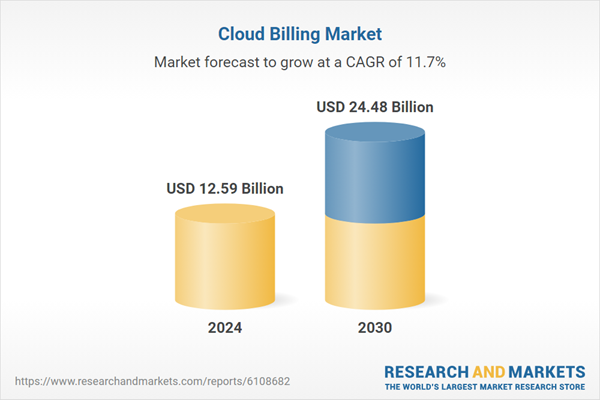Speak directly to the analyst to clarify any post sales queries you may have.
10% Free customizationThis report comes with 10% free customization, enabling you to add data that meets your specific business needs.
Key Market Drivers
Accelerating Cloud Migration and Multi-Cloud Strategy Adoption
The transition from traditional on-premises infrastructures to public and private clouds is accelerating, leading to increased complexity in managing cloud usage and associated costs. As companies embrace multi-cloud strategies to optimize cost, performance, and redundancy, cloud billing solutions become indispensable for consolidating billing data from various platforms and generating accurate financial reports. These tools not only help avoid billing surprises but also assist in budgeting and financial planning. Additionally, as cloud environments grow, organizations need detailed cost allocation by departments or projects. Modern billing platforms offer granular insights that support chargeback and showback models, promoting fiscal accountability. Enterprises have reported a 52% reduction in billing discrepancies within three months of adopting centralized cloud billing systems, attributing improvements to real-time usage visibility, automated invoice reconciliation, and streamlined internal cost tracking.Key Market Challenges
Complexity in Managing Multi-Cloud Billing Environments
The widespread adoption of multi-cloud strategies has introduced considerable billing complexities. Integrating billing systems across providers like AWS, Microsoft Azure, and Google Cloud presents challenges due to differing pricing structures, billing cycles, and resource measurement methodologies. Even within a single provider, pricing variations by region and service type further complicate cost tracking. This fragmented approach leads to reduced visibility, administrative burden, and risks of cost inaccuracies.Moreover, the absence of standardized billing frameworks often forces enterprises to use third-party tools or develop internal solutions, which increases both cost and operational complexity. The integration of cloud billing with ERP systems and financial reporting tools is also challenging, often causing delays and discrepancies in financial processes. These hurdles can undermine financial control, resulting in inefficiencies, compliance risks, and erosion of trust among stakeholders.
Key Market Trends
Integration of Artificial Intelligence and Predictive Analytics into Billing Platforms
One of the most significant developments in the cloud billing sector is the adoption of artificial intelligence (AI) and predictive analytics. These advanced technologies enhance billing systems by enabling real-time optimization, anomaly detection, and accurate cost forecasting. Through machine learning, platforms can identify unusual usage patterns, predict future expenses, and help businesses manage costs proactively. AI also facilitates automation by recommending pricing tiers, flagging underutilized resources, and forecasting infrastructure needs based on application behavior. These capabilities are especially beneficial in dynamic environments like e-commerce or media streaming, where demand fluctuates rapidly. As AI-driven billing becomes more refined, it is expected to become a standard feature in next-generation platforms, driving operational efficiency and reinforcing financial governance.Key Market Players
- Oracle Corporation
- Amazon.com, Inc.
- Salesforce, Inc.
- SAP SE
- Microsoft Corporation
- Zuora, Inc.
- Huawei Technologies Co., Ltd.
- Recurly, Inc.
Report Scope:
In this report, the Global Cloud Billing Market has been segmented into the following categories, in addition to the industry trends which have also been detailed below:Cloud Billing Market, By Deployment:
- Public Cloud
- Private Cloud
- Hybrid Cloud
Cloud Billing Market, By Billing Type:
- Subscription Billing
- Usage-Based Billing
- Tiered Billing
- Flat-Rate Billing
Cloud Billing Market, By End User:
- BFSI
- Telecom
- IT Software
- Healthcare
- Retail
- Others
Cloud Billing Market, By Region:
- North America
- United States
- Canada
- Mexico
- Europe
- Germany
- France
- United Kingdom
- Italy
- Spain
- Asia Pacific
- China
- India
- Japan
- South Korea
- Australia
- Middle East & Africa
- Saudi Arabia
- UAE
- South Africa
- South America
- Brazil
- Colombia
- Argentina
Competitive Landscape
Company Profiles: Detailed analysis of the major companies present in the Global Cloud Billing Market.Available Customizations:
With the given market data, the publisher offers customizations according to a company's specific needs. The following customization options are available for the report.Company Information
- Detailed analysis and profiling of additional market players (up to five).
This product will be delivered within 1-3 business days.
Table of Contents
Companies Mentioned
- Oracle Corporation
- Amazon.com, Inc.
- Salesforce, Inc.
- SAP SE
- Microsoft Corporation
- Zuora, Inc.
- Huawei Technologies Co., Ltd.
- Recurly, Inc.
Table Information
| Report Attribute | Details |
|---|---|
| No. of Pages | 185 |
| Published | July 2025 |
| Forecast Period | 2024 - 2030 |
| Estimated Market Value ( USD | $ 12.59 Billion |
| Forecasted Market Value ( USD | $ 24.48 Billion |
| Compound Annual Growth Rate | 11.7% |
| Regions Covered | Global |
| No. of Companies Mentioned | 8 |









